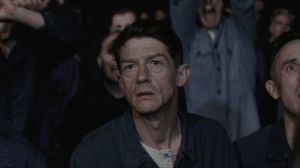On Tuesday, for the first time in nearly 16 years, the Writers Guild of America went on strike after contract negotiations with the Alliance of Motion Picture and Television Producers broke down with no agreement in place. On Monday night, when talks shut down ahead of the midnight deadline, the WGA officially ordered its members to go “pencils down”, acting on the authority granted by the membership previously and voted unanimously to call the strike effective at 12:01 a.m. Tuesday, May 2nd with members asked to head to the picket line as early as Tuesday afternoon.
Videos by ComicBook.com
Almost immediately, the impact of the decision to strike began to be felt, with late night talk shows — including The Late Show With Stephen Colbert, Jimmy Kimmel Live! and The Tonight Show Starring Jimmy Fallon — shutting down immediately. On Tuesday, it was announced that Saturday Night Live was also canceling their upcoming episode which was set to feature the return of SNL alumnus Pete Davidson. Other shows have also begun updating about their status with some, such as HBO’s House of the Dragon‘s second season, indicating that they would not be impacted by the strike due to scripts already being completed.
But while this current WGA strike and its impact on the entertainment landscape is seemingly just beginning as writers seek to resolve, among numerous points, issues of compensation and employment, for fans, there are a lot of questions about what’s going to happen to their favorite shows and programs. With that aspect of things in mind, it’s worth looking back at the last WGA strike and the impact it had on many beloved television shows during the 2007-2008 television season and beyond.
Background: About the 2007-2008 WGA strike
Every three years, the WGA negotiates a new contract with the AMPTP, with that contract being called the Minimum Basic Agreement (MBA). In 2007, negotiations on a new MBA reached an impasse, prompting the WGA to call for a strike. The strike was ordered on Friday, November 2, 2007, and began on Monday, November 5, 2007. Key issues during the MBA negotiations involved DVD residuals, union jurisdiction over animation and reality television writers, as well as compensation for content in the then-emerging category of “new media” — think digital content, such as the internet.
The strike ended up lasting until February 12, 2008, with the WGA gaining precedent-setting jurisdiction over new media. The strike had a major impact on entertainment — particularly television — as well as an economic impact. An NPR report at the time estimated that the strike cost the economy of Los Angeles an estimated $1.5 billion.
The strike had a wide impact on the 2007-2008 television season, though the impact varied. There were some shows — mostly reality shows such as The Amazing Race and game shows — which saw increased numbers of episodes. Other shows, including many soap operas, were unaffected due to scripts having been completed for a lengthy duration prior to the strike or the series having been on hiatus or not renewed until post-strike. One notable exception was AMC’s Mad Men, in which Lionsgate made a side deal that allowed production to resume.
But while there were shows that were minimally impacted, there were many that were delayed, had abbreviated seasons, or ended up with seasons regarded by fans to be some of their worst – and in one case saw a major change for a character. Here are just a few.
Breaking Bad
The first season of Breaking Bad was impacted by the strike with only seven of the nine planned episodes completed prior to the strike. While this seems like something that could have been a major problem for a brand-new series, we do know that Breaking Bad ultimately survived and went on to be one of the most memorable shows on television — though the strike did have an impact. Dean Norris’s character, Hank Schraeder was originally planned to be killed off at the end of Season 1. However, because the episodes hadn’t been written due to the strike, his character was spared.
Heroes
Heroes was heralded as a phenomenon by many when it debuted its first season in 2006 and Season 2 of the series was set to be ambitious, originally designed to contain three volumes — Generations, Exodus, and Villains — as part of its storytelling arcs with 24 planned episodes. However, only 11 episodes aired, the Exodus arc was scrapped entirely due to the strike and Villains ended up carrying into Season 3. There was also a planned six-episode spinoff series, Heroes: Origins that was postponed and then cancelled entirely due to the strike. The series also saw a decline in ratings and while it would ultimately come back for Seasons 3 and 4, the series and its storytelling never fully rebounded.
Lost
Lost‘s fourth season was impacted by the strike. Production had begun in August 2007 and was halted in November that year due to the strike. There had been 16 episodes planned for the season, intended to run straight through as one consecutive block, but instead, it aired eight episodes, then took a mini hiatus with the series returning post-strike in April 2008 for a slightly shortened season consisting of just 14 episodes.
The Office
Another series that saw its episode count and season interrupted was The Office. The fourth season of the series was originally ordered to have 30 episodes, but only 12 were filmed prior to the strike. Seven more episodes would ultimately be completed after the strike, but the reduced number of episodes led to some losses. Notably, a script for. Christmas-theme episode was discarded, though it was later recycled for Season 9.
Smallville
Season 7 of Smallville also took a hit. Initially intended to have a 22-episode season, only 15 were completed prior to the strike and five were completed after, but the strike also impacted airdates, causing several airdates to be pushed back as well as cost series star Allison Mack her directorial debut, not to mention impacted the series’ ratings. The series was also prepared to end its season on episode 15 due to the strike, leaving things on a major cliffhanger and when the series did return for the remaining episodes, it was a wild ride to say the least. The series recovered, however, continuing to run through Season 10.
Pushing Daisies
For many, Pushing Daisies may be the biggest “loss” of the 2007 strike. Created by Bryan Fuller, Pushing Daises debuted on October 3, 2007, to wide critical acclaim, but due to the strike, only 9 episodes were completed for its first season. The series didn’t return until almost a year later for its second season in November 2008. A total of 13 episodes had been produced or the second season, but after just six had aired, ABC canceled the series. Four more episodes were aired through the month of December and then, fans in the United States had to wait until May and June of 2009 for the final three as part of promotion for the Season 2 DVD.








